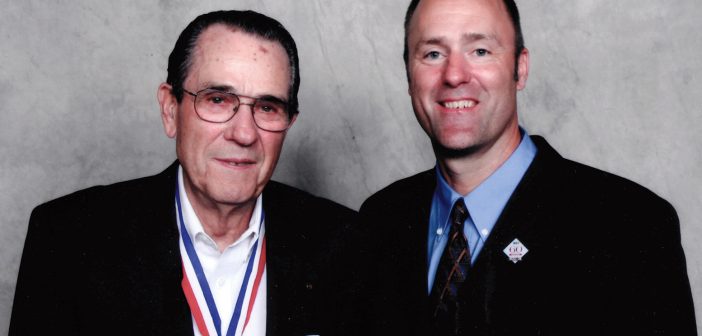
Jim Marsh, Hart Novelty, Bellingham, Washington
Meet the New Chief
Washington State’s Jim Marsh Sees Continuing Education as Key Component As He Steps Into President’s Role At AMOA
by Hank Schlesinger, RePlay Contributor
Set to take the top spot as president of the AMOA, Jim Marsh of Hart Novelty, Bellingham, Washington, is a second-generation operator. Now, with the upcoming appointment, he will also become a second-generation AMOA president. His father, Al Marsh, served in the same position from 1986 to 1987. With more than 30 years of experience in coin-op along with a long history with the association, the second-generation Marsh is uniquely suited to the job.
However, Marsh’s appointment comes at a critical time. Today’s operators are facing a number of challenges, ranging from the rapidly evolving technologies to the necessary expansion of equipment portfolios into new types of devices. Marsh’s extensive experience, both in the AMOA and as a small, independent operator, places him in the center of some of the industry’s most significant changes in decades.
RePlay chatted with Marsh to discuss the issues operators are facing and the role the AMOA can play in helping them meet those challenges.
Q: You’re now heading up Hart Novelty. Can you provide a little background on the company and your career there?
A: Sure. We’re a full line amusement game operator. It’s a family business, and my dad started working here in 1950. He was filling in for a buddy who hurt himself, and eventually ended up owning the company. Then, in 1987, I took a year off from college to help my dad when he was president of AMOA. I never intended to stay in it for this long, but it’s a nice way to make a living in the community I love and enjoy.
What is the geographic reach of Hart?
You can say that geographically we’re kind of blocked in. There’s the Pacific ocean to the west, Canada to the north, and the Cascades to the east. So, we’re essentially bounded on three sides. We handle three counties comfortably, as well as a small route on the San Juan Islands.
Do you have a specialty when it comes to locations?
I’m a classic operator in bars, taverns, restaurants, skating rinks, basically anywhere I can create a relationship with the business owner. Jukeboxes take up the lion’s share, but we also have ATM machines, pinball, video, darts and pool tables. Right now, we’re branching out into redemption, and that’s been good for us as well. Basically, we operate anything that you can attach a payment device to and make money with.
What kind of infrastructure do you have at Hart…employees, vehicles, that kind of thing?
We have four employees and a small fleet of different vehicles that includes trucks and trailers, route cars, and small vans.
As the Expo closes and you begin your term as AMOA president, is there anything you want to get across as the association head?
As I said, I consider myself a classic small operator, so one of the messages I want to be getting out there is encouraging smaller operators to get involved with the association. I want to tell them that if they want to get involved, there’s a path for them. I want to try to champion a little bit for the smaller guy while I’m president.
What about FECs?
I know it might rub some of our members the wrong way, but if you’re an FEC owner and you have multiple locations, you’re an operator and you’re more than welcome to join our association. This industry is changing, and we’ve got to change with it. One of our former presidents, Marion Paul, who owns Fannie Farkle’s in Gatlinburg, Tennessee, was an FEC operator. She got involved and had a vision that benefited the association.
What specific challenges facing small operators do you see out there? More importantly, what kind of remedies do you see?
I’ve always been an advocate of education, and I’m gratified we have a partner in the AAMA that shares that vision. It’s a mistake if you come to the show only to see the equipment.
I feel passionately about our trade association. I really think it enhances a business, and want to encourage the small guy and get them involved with educational programs. I want to encourage them to try things they haven’t thought of before. Education is a part of that and is a priority for AMOA. I want to continue to push and promote it.
Aside from the formal education programs, AMOA has long been seen as offering a chance for networking with operators from around the country. Where do you place that more informal educational opportunity?
Again, it’s a mistake if you come to a show and only see the equipment. You have to reach out to people wearing an AMOA badge and ask them about their experiences. These smaller operators are going to have to reach out and educate themselves and find a way to make a living, and I think our trade association has a lot of opportunities for that.
I think we have programs in place that really benefit the small business owner. From a personal side, by getting involved in AMOA, I’ve made a number of friendships across the country, so if I need to reach out to someone who is a redemption expert, I can find three, four or five people. There isn’t a week that goes by that I don’t call a larger operator and pick his brain. Had I never gotten involved in the AMOA, I never would have developed those friendships. It’s just a huge benefit to your business.
Also, I’ve presented seminars at AMOA, and I’m always surprised and gratified by the number of people who have called me up to ask me questions. I am happy to answer. Every tradeshow I’ve ever gone to has more than paid for my airfare and hotel.
But, if you just show up to walk the tradeshow floor and look at equipment, then you’re only getting a portion of what Expo has to offer.
What kind of specific challenges do you see for the smaller operator?
Technology can be a challenge for the small business owner. It’s moving so fast that sometimes you buy a game that seems like the next trend, and it’s already out of fashion by the time it’s out on your route. Educational programs help with that. Most definitely, if there’s a seminar, say it’s on cashless and how that affects your business, you need to be there. And you need to listen to these experts coming in. You also need to be going to social events and having conversations. It’s staggering how important that can be when it comes to running a successful business.
Where do the state associations fit into all this? What role do you see them playing?
State associations fill another niche. They are all about local issues and ordinances, and local and state laws. In the case of the Midwestern state groups, which have many of the pool and dart leagues and tournaments, they can assist with all that as well.
AMOA has a program now for states that don’t have associations, which can help them get up and running. All you have to do is call AMOA headquarters and they’ll get you the information and help.
In your estimation, are state associations in good shape? Is it a healthy segment?
Absolutely. At AMOA’s Affiliated States meeting, we had the largest number of state associations we’ve ever had. What we’re doing with this program has been very successful in growing the number of states that have active groups. What that says about the industry is that the people are active and involved, and they want their businesses to continue to succeed. Joining or forming a state association is one of the things they need to do.
Membership in national and state trade associations are an important part of running a successful business.
You keep coming back to education as an important factor? Can you explain why?
I really think a small operator can better navigate the evolution of the industry through education. And I do believe our industry is evolving. Every operator needs to get educated and involved. You can’t do that from home or your office. It just doesn’t happen.
Jim Marsh is the second-generation leader at Hart Novelty (Bellingham, Washington), following in the footsteps of his father (and past-AMOA president) Al Marsh who passed away in 2009. Jim left college to fill in for his father during his 1986-1987 AMOA term and never left, enjoying living and working in the community he loves. Hart Novelty got its start in the 1940s as a pinball and jukebox operation founded by Joe Hart, later run by Jack Roberts until the 1960s when Al Marsh took the reins. (He started working at the company back in the ’50s. Today, Hart covers some 60 square miles across Whatcom, Skagit and Island Counties with street locations that range from upscale urban to blue-collar rural. It still specializes in jukes and pins, but has added a host of other amusement devices to its portfolio, including redemption units along with ATMs.
Jim himself is every bit the kind gentleman his father was and should bring a steady hand to the helm of the national operator group. During his term, he hopes to bring more FEC owners into the membership, encourage operators to take advantage of networking opportunities and continue growing educational programs.




